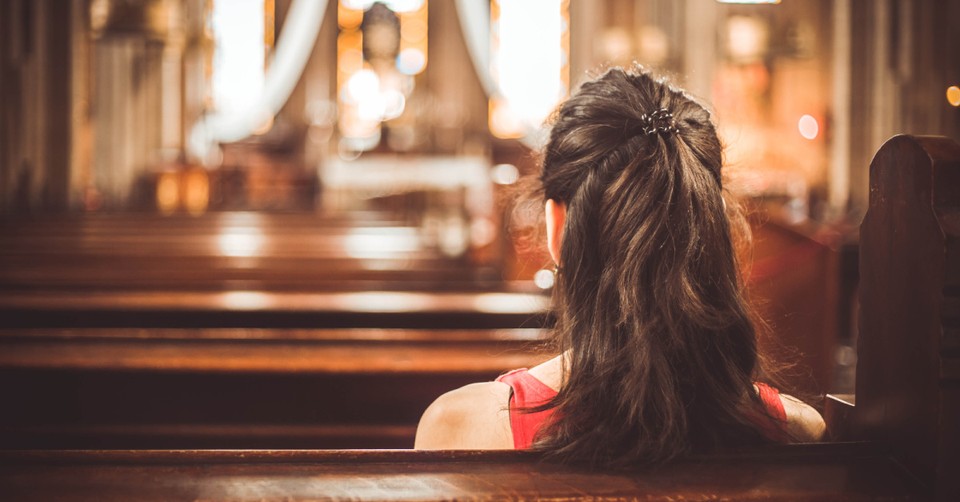Why the Church Needs Female Theologians

Of the 4,944 Bible commentaries listed on respected review site BestCommentaries.com, only 196 are written by women. That’s less than 4 percent—despite the fact that women make up 55–59 percent of Protestant congregations.
Does it matter that we have so few women theologians? Why should we care?
I’ll answer those questions—really—but first, let’s take a detour through Hagar’s story in Genesis 16. She was an Egyptian servant impregnated by Abram (Abraham) after Sarai (Sarah) couldn’t get pregnant. Sarai lashed out at Hagar, so she fled. Even the wilderness between her and her home in Egypt must have seemed more hospitable than Sarai and Abram’s tent.
Picture Hagar as she sits by a spring of water to catch her breath, exhausted from her journey and from growing a tiny human and wondering how she’s going to make it all the way home. In this low moment, God appears to Hagar. He speaks kindly to her (“the Lord has heard your cry of affliction”) and even gives her a promise. And then—we should be shocked by this—a Gentile servant woman becomes the first person in Scripture to give a name to God: “You are El-roi,” she says, because “in this place, have I actually seen the one who sees me?” (v. 13, CSB). After seeing, conversing, and naming God, Hagar follows his instructions: “So Hagar returned [to Abram and Sarai], enriched by the experience she had had of the wonderful protection and care of the Lord and knowing that he was not far away, but at hand and accessible” (The Message of Genesis 12–50: From Abraham to Joseph)
Hagar’s story is only one example from Scripture of how God pays special attention to women, giving them dignity and highlighting their importance. The Bible was written at a time that wasn’t friendly to women—for example, women were excluded from parts of the Temple and could be divorced for any reason (The IVP Bible Background Commentary: New Testament). Despite being overlooked by society—even by God’s own people—God himself took notice of women and put their stories in the public record.
How We Read Bible Stories about Women Wrong
Too often, we assume the worst of women in Scripture. Take the woman at the well in John 4, for example: Is she a promiscuous woman with five ex-husbands and a live-in, as she’s often portrayed? Or could she be a woman who experienced loss after loss after loss, who cannot survive independently in her culture, but who cannot remarry perhaps for legal, financial, or familial reasons? As Jeannine K. Brown notes in The Gospels as Stories: A Narrative Approach to Matthew, Mark, Luke, and John,
While there is no way to know the precise configuration of this woman’s marital past, if we as readers take our cues from the first century rather than the twenty-first century, we will be less likely to hear the woman as patently immoral. This more generous reading is confirmed by the lack of any clue from John (as narrator) that Jesus calls her out as a sinner. The language of sin, in fact, is absent from the entire account (79).
And just like with Hagar, God sees a gentile woman, talks with her, and gives her the water of life.
The woman at the well is not the only woman whose story has been read (and interpreted) uncharitably. Consider these women:
- Some say Deborah was only a prophet because the men were wimpy, but surprise—that’s not what the text says. She was a prophet before Barak asked her to go to war with the army (Judges 4:4-9).
- Yes, Miriam got arrogant once (Num 12:1-15), but she was also a prophet who led the women of God in singing his praises (Exodus 15).
- Maybe you’re used to hearing that Martha was overbearing and bossy to Mary when Jesus was right there. But what if Jesus was encouraging Martha to provide the group a simple meal instead of a massive feast, and he wasn’t shaming her into dropping everything to sit at his feet (Luke 10:38-42)? (I was introduced to the ideas about the woman at the well and Martha by JoAnna M. Hoyt’s messages at Restoration Anglican Church in Richardson, TX.)
If we read Scripture in its context without making twenty-first century assumptions, not only will we correct our false narratives about women, but we’ll also see that women are valued—as women. Dorothy L. Sayers, in her book, Are Women Human? Penetrating, Sensible, and Witty Essays on the Role of Women in Society, writes:
Perhaps it is no wonder that the women were first at the Cradle and last at the Cross. They had never known a man like this Man—there has never been such another. A prophet and teacher who never nagged at them, never flattered or coaxed or patronized; who never made arch jokes about them, never treated them either as “The women, God help us!” or “The ladies, God bless them!” (346-348).

Photo Credit: ©Getty Images/PaulMaguire
Serving in God’s Kingdom, Side By Side
The Bible highlights the dignity and theological ability of women—all women—mothers and non-mothers, married and single, sinners and saints, outcasts and in-crowds, rich and poor, leaders and followers. God’s Word shows that women have never been spectators in kingdom work, but they’ve been serving on the frontlines since the beginning.
If we take our cues from Scripture, we’ll see that women have been theologians all along, just as men have. And for that matter, the Bible shows that Gentiles and Jews have been theologians, rich and poor, slave and free, young and old. (If the word “theologian” throws you off, don’t overthink it! Theology is simply the study of God, so anyone who studies God is a theologian. Some can turn it into a career, but that doesn’t mean other Christians aren’t theologians.)
That’s the point: God calls all of us to work in his kingdom. As one church, we need everyone—every member of the global body of Christ—investing their gifts and their lives in the spiritual harvest. And, as demonstrated by the number of Bible commentaries written by women, we have a huge gap when it comes to seeing our entire body represented in ministry, publishing, academia, and beyond. Women bring something unique to the table in the same way that men do; older believers and younger believers bring different things to the table (1 John 2:12–14); Black and Asian and Hispanic and First Nations and white believers too. Our age, our sex, our race, our geography, our education—everything about each of us gives us a unique perspective that we bring to God’s Word and the study of theology. Experience is not king (or queen!), but it matters that God tailored the way he revealed himself to Hagar, it matters that Paul tailored the way he proclaimed the gospel of Christ to fit his hearers, and it matters that God tailors the way he reveals himself to groups of people today.
Truly, if what we as Christians want is a deeper and truer knowledge of God, we’ll want more than one perspective. Throughout the pages of Scripture, we get to walk a mile in the shoes of Miriam, Rahab, Mary Magdalene, and Phoebe—as well as Joseph, Jeremiah, Timothy, and Onesimus. The variety of people and perspectives that fill our churches, seminaries, and Bible studies are meant to be a gift to us, popping our God-and-me bubble so we can behold more of God’s glory.
Really, Why Do We Need Women in Theology?
As we read the Bible, we’ll see that the women God loves are right in front of us. We need to understand how a woman without children (perhaps by infertility) reads passages about God’s care for barren women. We need to see the incredible value Scripture gives single women. We need to notice the ways God provides for single moms fighting for their children. We need to be challenged by what Jesus says to women who are forgotten or despised by their community. We need to see how God uses the work of smart, ambitious women in their careers and in the church. We need to recognize the trust that Paul placed in women who supported the fledgling, sometimes faltering early church. And all of them were theologians.
So, back to our original question: Why do we need women in our sanctuaries and seminaries, women who are writing theologies, publishing podcasts, and sharing their stories? Why does it matter that women are involved at all? Because, rather than adding something to an already-enough theological system, we find that we need women’s contributions. Just as it was not good for the man to be alone in the Garden of Eden, just as the work of cultivation was given to both man and woman, men and women need each other in the work of kingdom and theological cultivation.
And if you’re a woman considering going deeper into theology, DO IT. Give it all you can (God knows your capacity), and share all you discover. Your eyes, your heart, and your perspective are what we need to grow together into spiritual maturity and to show the world the God who sees.
Sources Cited:
Joyce G. Baldwin, The Message of Genesis 12–50: From Abraham to Joseph, eds. J. A. Motyer and Derek Tidball, The Bible Speaks Today (UK: InterVarsity Press, 1986), 60.
Craig S. Keener, The IVP Bible Background Commentary: New Testament (Downers Grove, IL: InterVarsity Press, 1993), Lk 16:18.
Jeannine K. Brown, The Gospels as Stories: A Narrative Approach to Matthew, Mark, Luke, and John (Grand Rapids, MI: Baker Academic, 2020), 79.
Dorothy L. Sayers, Are Women Human? Penetrating, Sensible, and Witty Essays on the Role of Women in Society (Grand Rapids, MI: Eerdmans, 2005), loc. 346-348. Kindle edition.
Photo Credit: ©Getty Images/Kadirdemir
Jennifer Grisham is the managing editor for Word by Word (the Logos blog). She previously served on church staff as director of administration and managing editor and administrator for Doxology & Theology, and she’s a current student at Northern Seminary. Her work has been published by The Gospel Project and The Gospel Coalition, to name a few.
Originally published April 01, 2025.







